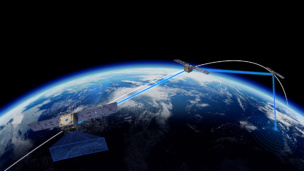This week, Germany gave the world a peek at its strategy to maintain security in space—including how it wants to spend its €35B investment in space-based defense projects during the next five years.
Diplomatic action: The document, “Space Safety and Security Strategy,” begins by laying out the importance of space as a critical domain underpinning much of modern life. Maintaining space as an arena for economic growth and prosperity is vital to maintaining peace on the ground, Germany argued. As a result, the country’s first strategy to maintain order is a diplomatic one.
As the largest economy in the EU, Germany plans to lead a pan-European space security architecture, guaranteeing sovereign access to space and encouraging international collaboration and space data-sharing. The country also plans to beef up its work within the UN to bring modern definitions into international treaties on the use of space weapons, ensuring that orbit remains free of nuclear weapons and threatening behaviors.
The strategy isn’t all talk, however. It’s reminiscent of the US foreign policy under a saying quoted by Theodore Roosevelt: Speak softly and carry a big stick.
The stick: Germans being Germans, the strategy is detailed down to the minutia. The strategy includes 21 strategic lines of action to identify risks and develop options for response, 19 strategies for international cooperation, and 25 action items to build deterrence and strategic defense capabilities.
Some of the new technologies in mind for military space defense include:
- Deep precision-strike and hypersonic capabilities to deny adversarial access to space;
- Highly agile ISAM capabilities and reusable spaceplanes to resolve technical issues in orbit;
- Active and passive protections against electromagnetic warfare, and nuclear explosions in space;
- Bodyguard satellites to defend allied assets, and inspect adversarial space systems;
- Fully meshed, resilient constellations for German military use;
- Responsive launch capabilities;
- Non-chemical propulsion systems;
- Reentry and landing technologies.
The business case: While Germany’s focus is military and defense ideology, the strategy calls for a whole-of-government and nationwide approach to building out orbital capabilities. Ultimately, that’s good news for the entire European space industry, and leaders expect that a large portion of the €35B will find its way into the hands of Europe’s new space economy.
“This strategy marks a turning point. This will probably be the end of the old way of doing things, which was characterised by painfully slow procurement, far too much red tape, and a preference for a small number of big contractors,” Felix von Schubert, executive chairman and partner at NewSpace Capital, told Payload. “Germany is setting a new direction of travel…[and] private investors must aim to match this political ambition and accelerate the space sector’s growth.”





